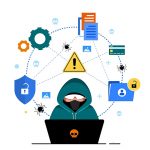
In our ongoing IT Support LA blogs, the general thrust is usually about protecting your data and network systems, but what about your Cybersecurity at home? Your business can be severely damaged or outright ruined by a data breach, but your own life can by devastated by Identity Theft.
To that end, we have assembled a few common-sense precautions – some of which are fairly obvious, like not putting anything with any account information or your SSN (Social Security Number) in the trash, but with the technology available today, it’s wise to look at seemingly innocuous objects like anything with a wireless connection.
You wouldn’t think cyber crooks could use child’s toy to steal of your personal data, but this literally happens all the time. Every time a new connected device comes on the market, hackers are looking to exploit it. But it isn’t all electronic theft - how about your trash can sitting outside? Is it a treasure trove for an identity thief trolling the neighborhood at night?
All kinds of everyday objects can lead to identity theft, but people tend not to think about them, instead focusing on their computers and cloud accounts. It’s important to have strong passwords and use antivirus and Multi-Factor Authentication (MFA) on your devices, but you also need to be wary of other ways that hackers and thieves can get your personal data.
Here are six common things that criminals can use to steal your information.
Old Smart Phones
According to Statista, smartphones are replaced about every two and a half years. That’s a lot of old phones laying around containing personal data.
So many among us virtually live on our mobile phones, so think of all the personal information they hold. We have synchronized connections with cloud services. Phones also hold banking apps, business apps, and personal health apps. These are all handily stored on one small device.
Smartphones have been able to hold more ‘stuff’ as chip technology has advanced, meaning that documents and spreadsheets can now be easily stored on them along with reams of photos and videos.
A cybercriminal could easily strike data theft gold by finding an old smartphone. You shouldn’t just throw electronics away like normal garbage – they contain varying degrees of toxic components, so you should also dispose of them properly. Make sure that you clean any old phones by erasing all data - at least remove the SIM card and destroy it.
Wireless Printers
These days most printers are wireless. This means they are not just connected by a cable to your computer, they are part of your home or work network. Printing from another room is convenient, but the fact that your printer connects to the internet can leave your data at risk.
Printers can store sensitive documents, such as contracts and tax paperwork. When putting data security protections in place, most people don't think about the printer. If you are not thinking about your printer, cyber thugs are – and they are looking for ways to hack them. When this happens, a hacker can not only glean data from the printer, but they could also leverage it to breach other devices on the same network.
Ensure that your printers are protected by keeping their firmware updated. Always install updates as soon as possible. You should also turn it off when you don’t need it, because when it’s off it’s not accessible by a hacker.
If you work from home and use the printer for work, your in-house IT services team or Managed Services Provider can handle this for you.
USB Sticks
Have you ever run across a USB stick laying around or received one by surprise in the mail – as a promotional give-away? Perhaps you thought you scored a free removable storage device or maybe you’re a good Samaritan and want to try to return it to the rightful owner. First, you need to see if the owner’s identity is in the flash drive.
Hair should stand up on the back of your neck when you reach to plug a USB device of unknown origin into your computer. This is an old trick in the hacker’s book, but it still works. They plant malware on these sticks and then leave them around as bait. If you plug it into your device, you can be infected even if you didn’t access any data on the drive.
For more information, please browse through the previous warning on our IT Support LA blog: ‘Free Flash Drives? Not So Fast.’
Old Hard Drives
When it comes time to dispose of an old computer or old removable drive, make sure it’s clean. Just deleting your files isn’t enough. Computer hard drives can have other personal data stored in system and program files, which you can’t readily see.
Plus, if you’re still logged into a browser, a lot of your personal data could be at risk. Browsers store passwords, credit cards, visit history, and more.
Your best bet is to get help from an IT services professional to properly erase your computer drive. This will make it safe for disposal, donation, or reuse. Either that or get out the sledgehammer.
Trash Can
We presume everybody knows not to put Personally Identifiable Information (PII) in a trash can outside, because identity theft criminals aren’t only online. They can also be trolling the neighborhood on trash day. Be careful what you throw out in your trash.
It’s common for garbage to enable identity theft. It can include pre-approved credit card offers that you toss out as ‘junk mail.’ Your trash can also hold voided checks, old bank statements, and insurance paperwork. Any of these items could have the information thieves need to commit fraud or pose as you.
A shredder is worth the cost. You should shred any documents that contain personal information before you throw them out. This extra step could save you from a costly incident.
Children’s IoT Devices
It seems like everything is connected these days: electronic bears, smart kid watches, Wi-Fi-connected Barbies – these are all toys that hackers love. Mattel’s Hello Barbie was found to enable the theft of personal information. A hacker could also use its microphone to spy on families.
The problem is that kids really want these futuristic toys, and parents might think they’re cool, but don’t consider their data security. After all, what could be more innocent than children’s toys? But that often means they can be easier to hack. Cybercriminals also zero in on these IoT (Internet of Things) toys, knowing they aren’t going to be as hard to breach.
You should be wary of any new internet-connected devices you bring into your home - including toys! Anything connected is not necessarily benign. Install all firmware updates. Additionally, do your homework to see if a data breach has involved that particular toy.
Frequently Asked Questions
Q: What is considered PII?
A: PII (Personally Identifiable Information, is sensitive data that could be used to identify, contact, or locate an individual.
Q: What are examples of PII?
A: Examples would include personal identification numbers: social security number (SSN), passport number, driver's license number, taxpayer identification number, patient identification number, financial account number, or credit card number. Personal address information: street address, or email address. Personal telephone numbers.
Q: How do IoT devices get hacked?
A: One extremely popular method of attacking IoT devices is brute-forcing passwords on Telnet and SSH services that are not disabled. One access to these services is gained, attackers can download malware to the device or gain access to valuable information.
Q: How secure are shredders?
A: For highly sensitive information, such as a Social Security Numbers or financial statements, you should use a level P-5P or higher. A P-5 shreds your document into 2,000 pieces, while for just a little more money, a P-6 shreds it into 6,000 pieces. A P-4 shredder is the minimum security level for sensitive information, but as it only shreds a document into 400 pieces, it does not deliver enough cuts to be considered high security – some crooks may be willing to piece 400 cuts back together.
How secure is your network?
As a reputable member of the IT Support Los Angeles community since 2002, IT Support LA offers a FREE, no-risk network and security assessment. It is a non-intrusive scan that allows us to deliver a comprehensive report that is yours to keep. No strings, and no obligation to ever use our Managed IT Services.
The best defenses are expert Cybersecurity to protect your data from theft, and a top-notch Managed Services Provider (MSP) to ensure continued reliability and defenses against newly emerging threats.
With our 100% Money Back Guarantee in writing, we offer a risk-free way for prospective clients to try us out. Because we do not require a ‘hard’ contract, our clients can fire us at any time with 30 days’ notice. We have to be good.
Among the Managed IT services we provide:
IT HelpDesk Service
Onsite IT Support
Cybersecurity
Cloud migration and management
Email migration services
Backup and disaster recovery
VoIP phone systems
IT disposition and recycling
Office moves
White label services (IT to IT)
IT Support LA is an award-winning Managed Services Provider (MSP):
o 3 Years awarded Best IT by the Small Business Expo
o Awarded 2nd best company of any type in the US by the Small Business Expo SB100
o Awarded Best IT Support in California by Channel Futures
o Winner of Best IT Support in Los Angeles by Channel Futures
o Listed as one of the world’s Top 501 Managed Services Providers by CRN and in the top 250 in the ‘Pioneer’ listing
o 4 years listed as one of the Top 501 Managed Services Providers in the World by Channel Futures
o Globee 2021 Bronze Award winner for Chief Technology Officer of the Year
o Globee 2022 Gold Award winner for Chief Technology Officer of the Year
o Named one of 2022’s 50 ‘Best’ businesses in California by UpCity
o Named Best of IT winner by UpCity
o Winner of Local Excellence Award for 2021, 2022 and 2023 by UpCity
o Named Best of Cloud Consulting winner by UpCity
o Certified as Top MSP and Cybersecurity Pro by UpCity
o Named Best IT in Los Angeles by Expertise.com.
Planning an Office Move?
Contact us today! We have the experience to ensure a seamless transition. After the move, your employees will arrive at the new location to find their IT infrastructure ready and open for business!
For more information on office moves, or to receive your FREE no-risk network and Cybersecurity assessment, just fill out the form on this page or call us at:
818-805-0909


